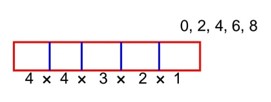Permutations and Combinations
Get insights from 121 questions on Permutations and Combinations, answered by students, alumni, and experts. You may also ask and answer any question you like about Permutations and Combinations
Follow Ask QuestionQuestions
Discussions
Active Users
Followers
New answer posted
5 months agoContributor-Level 10
A → 5Q; B → 5Q; C → 5QA
A?, A?, A?, A?, A?; B?, B?, B?, B?, B?; C?, C?, C?, C?, C?
A?A?A?B?C? → ?C? * ?C? * ?C? = 750
A?A?B?B?C? → ³C? * ?C? * ?C? = 1500
∴ Total = 2250
New answer posted
6 months agoContributor-Level 10
? P? =? P? ⇒ n!/ (n-r)! = n!/ (n-r-1)! ⇒ n-r=1.
? C? =? C? ⇒ r + (r-1) = n ⇒ n = 2r-1.
Substitute n: (2r-1)-r=1 ⇒ r=2.
New answer posted
6 months agoContributor-Level 10
Number divisible by 3;
(a) sum of the digit must be divisible by 3
(i) 3! = 6
(ii) 1, 3, 5 -> 3! = 6
(iii) 2, 3, 4 -> 3! = 6
(iv) 3, 4, 5 = 3! = 6
Total = 24
(b) Divisible by
4 * 3 = 12
(c) Now common divisible by both
2! = 2
For 3, 4 2! = 2
New answer posted
6 months agoContributor-Level 10
xyz = 24
24 = 23 * 3
Let's distribute 2, 3 among 3 variables. No. of positive integral solution =
No. of ways to distribute = 
New answer posted
6 months agoContributor-Level 10
1st position can be filled in 4 ways as zero cannot appear in 1st position.
2nd position can be filled in 4 ways and so on.
Total cases = 4 * 4 * 3 * 2 * 1 = 96
Taking an Exam? Selecting a College?
Get authentic answers from experts, students and alumni that you won't find anywhere else
Sign Up on ShikshaOn Shiksha, get access to
- 66k Colleges
- 1.2k Exams
- 686k Reviews
- 1800k Answers


